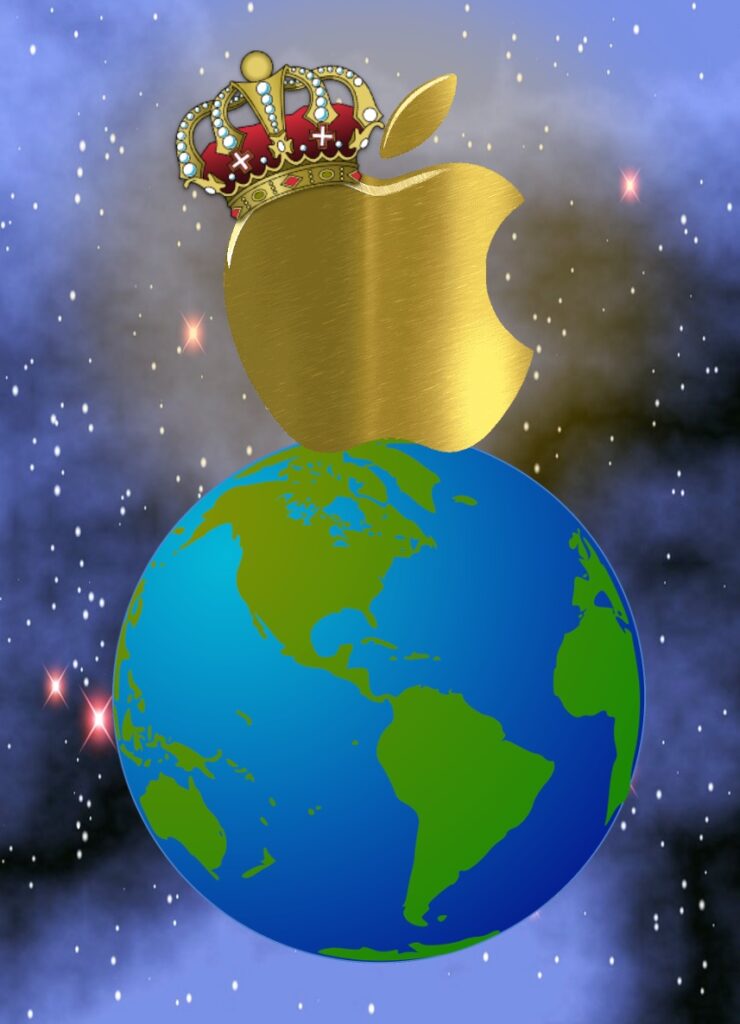Aug
24

Something remarkable took place on Wall Street last week. The total value of a company by the name of Apple, Inc.—perhaps you’ve heard of it—reached two trillion dollars.
Two. Trillion. As in a 2 followed by 12 zeroes. A value that, to date, no other U.S. company has ever attained.
PYMNTS.com did a great job of putting the initial digit and its train of zeroes in perspective:
… only seven countries on the planet have a GDP of more than $2 trillion. Among the companies whose GDP is less than Apple’s valuation: Italy, Brazil, Canada and Russia.
Moreover, a mere 18 days earlier, Apple was rocking the investment world by having attained a value of a trifling one trillion. Which means there’s no telling what that number may be when this post appears.
Not bad as comebacks go
Two trillion isn’t bad for a company that the biggest rock band in history made a habit of suing. (Namely, the Beatles. Perhaps you’ve heard of them, too.) Or for a company that in 1997, 10 years before iPhone was even a glimmer in Steve Jobs’s eye, was all but kaput.
That Apple was once on the rocks will come as no surprise to anyone familiar with Jobs’s approach. Brian Merchant’s book The One Device: The Secret History of the iPhone reveals Jobs’s habit of scheduling press conferences to announce products that, unbeknownst to the press, were neither completed nor fully proven. Behind the curtain, his team stood with crossed fingers, hoping against hope that the prototype they’d finished cobbling together only minutes earlier wouldn’t let them down. Remarkably, luck was with them every time.
In the end, Microsoft swooped in and saved the day by pumping $150 million into Apple. Not a few observers speculated that the move was calculated to ensure Microsoft of a continuing, worthy competitor in order to avoid anti-trust measures. If so, it may have helped, but not completely.
Not just Apple
Its $2 trillion aside, Apple is by no means the only high tech company riding high at the moment. The New York Times reported:
The stocks of Apple, Amazon, Alphabet, Microsoft and Facebook, the five largest publicly traded companies in America, rose 37 percent in the first seven months this year, while all the other stocks in the S&P 500 fell a combined 6 percent, according to Credit Suisse. Those five companies now constitute 20 percent of the stock market’s total worth, a level not seen from a single industry in at least 70 years.
I don’t for a minute pretend to be the only commentator who has observed the correlation between the COVID-19 pandemic and increased use of digital payment systems. The current self-quarantine environment certainly seems to have played its part. Back in March, the Times reported:
While the rest of the economy is tanking from the crippling impact of the coronavirus, business at the biggest technology companies is holding steady—even thriving … With people told to work from home and stay away from others, the pandemic has deepened reliance on services from the technology industry’s biggest companies while accelerating trends that were already benefiting them.
The gains are a mixed bag. We’re darned lucky that we have digital technologies at a time that we desperately need them. Yet significant numbers of people have no access to them. And no one with an ounce of morality, not even the biggest digital technology proponent, would call the toll in human lives worth it. (Shortly before the preceding Times piece ran, I posted, “Any havoc the pandemic wreaks on the global and local economies and any effects it has on the payments business pale in comparison to the cost of lost human lives. I am all for the growth of the digital payments industry. But not this way.”)
The future rarely plays by anyone’s rules
“Since 2020 has been a year full of all kinds of surprises,” opined PYMNTS.com, “hard predictions … are something of a sucker’s game. Where does Apple go from here—and how long will it take to get to $3 trillion? Depends on what the next entry in the hit parade is.”
It would be a mistake to assume that today’s burgeoning tech giants can count on being secure forevermore. The market has a long history of near-losers coming back from the brink à la Apple, and of the toppling of presumed topple-proof giants à la Sears.
The future has a habit of not being predictable. It’s part of what makes this business exciting.